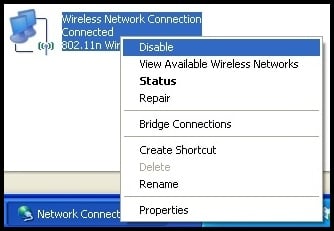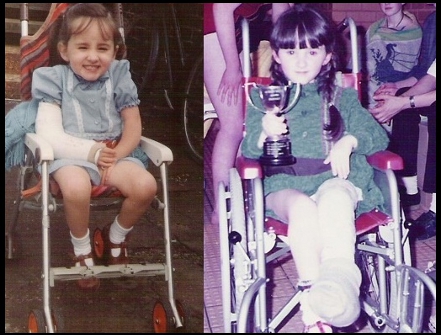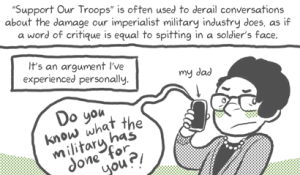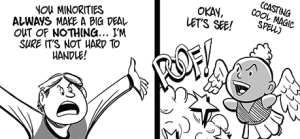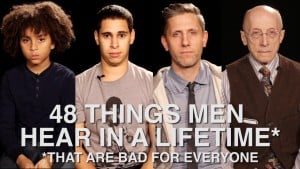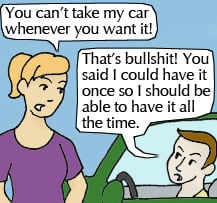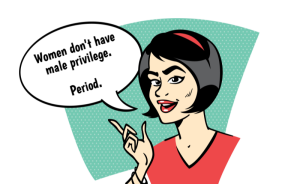Originally published on XOJane and cross-posted here with their permission.
I am not a “person with a disability.” I do not “have a disability.” Given that I look like this:

Credit: ewheeling
You probably think I’m either delusional or in denial. I’m not, I just have a real problem with the phrase “person with a disability” and the notion of “having a disability.”
I am disabled. More specifically, I am disabled by a society that places social, attitudinal and architectural barriers in my way.
This world we live in disables me by treating me like a second-class citizen because I have a few impairments — most obviously a mobility impairment.
Two Ways of Looking at Disability
What’s the difference between “having a disability” and “being disabled”? It all comes down to two sociological theories: the medical/individual model of disability and the social model of disability.
The medical model — the idea that a person has a disability — is the dominant notion in our society. It’s the idea that a person is prevented from functioning in our society by their body or brain and it’s just that person’s tough luck. If they can’t blend into this world, it’s not the world’s problem.
The social model is the way I prefer to view the world. It’s the idea that a person with an impairment or illness is disabled by the society we live in because of all the barriers that are put in our way.
Society disables me.
I live in London, which has a world famous underground train network. Only around 20% of the stations have wheelchair access. Someone with a medical/individual perspective would state that I am prevented from getting around my city because I’m a person with a disability and it’s tough luck that the Tube is so inaccessible.
If I want to use the Tube then I’m just gonna have to find a new skeleton from somewhere.
The way I see it is that I’ve been disabled when it comes to travelling around my city by the architects that installed stairs and escalators instead of ramps and lifts at the majority of Underground stations.
Stairs and escalators are man-made barriers put in the way by a discriminatory society that excludes me because I have impaired mobility. I continue to be disabled by a Mayor who has set the budget for improving access on the Tube to £0 for the next 3 years.
Most people look at the word “disabled” and assume it means “less able.” It doesn’t. It means “prevented from functioning.” When I turn the wireless connection off on my computer, I get told that the connection has been “disabled”:
Does this mean that my wifi has suddenly become less able or broken? Has my wifi acquired a disability? Of course not. It has been prevented from functioning by an external force.
In a very similar way to how I’m disabled by bus drivers that just won’t stop if they see me — a wheelchair user — waiting at the bus stop.
Hannah Cockroft is not someone you’d describe as “less able.” The woman is an unstoppable force on an athletics track. But she is disabled when it comes to traveling around London because of the man-made stairs and escalators at Tube stations.
As a person with a mobility impairment, I am disabled by steps, stairs, escalators, being denied computer access as I can’t write by hand, inaccessible housing, and so on. To me, a flight of stairs without a lift as an alternative is the equivalent of right-clicking me and selecting “disable Lisa.”
Once I learned about the social model, I realized that my body wasn’t the problem at all.
There are many who would argue that they do have a disability. They point out that even if all barriers put in place by society were removed, they’d still have things they can’t do.
Firstly in response to that: It’s a person’s right to identify however the hell they want. If they’re more comfortable as a “person with a disability” than as a “disabled person” then that’s nothing to do with me.
Secondly, most of these people haven’t noticed the social model’s distinction between “impairment” (the things you can’t do because of your body/brain) and “disability” (the social barriers disabling you on the grounds that you have an illness or impairment).
I have a mobility impairment and because of that society gets all right-clicky and prevents me from functioning to my full potential.
Some people state that the social model is just a sociological theory; it doesn’t make a bit of difference in one’s everyday life.
For me that’s just not true. I was about 17 when I learned about the social model and it radically changed how I thought about my own body.
When I was a child I would wonder “why me?” on a daily basis. I would wonder why my spirit had been put into this body that hurt so much of the time.
I hated my body when I was not allowed on school trips or when I was left in the classroom on my own while my classmates were doing something more fun. I’d get left in the classroom on my own with a math textbook — anything is more fun than that.
Once I learned about the social model, I realized that my body wasn’t the problem at all. The reason I spent so much time in pain was because I’d get half a paracetamol every 4 hours for multiple broken bones.
There was no need for me to be in pain; effective painkillers existed by the 1980s. I just wasn’t given any. Denying someone needed pain meds is an attitudinal barrier making their life needlessly difficult.
It also made me realize that the reason I was treated like crap at school wasn’t my body’s fault at all. It was disablist discrimination.
With hindsight, it seems so odd that I just accepted that my impaired body was to blame for all the misery I put up with during primary school, but it was the only difference I could see between me and all the other kids.
No one stopped and told me that I was being discriminated against, that it didn’t have to be happening, and that it wasn’t my body’s fault.
No one has ever told me that I should describe myself as a “person with gayness” or a “person with womanliness.”
The main argument in favor of the phrase “person with a disability” is that it’s “person first.” Whaaaat? No one has ever told me that I should describe myself as a “person with gayness” or a “person with womanliness.” I’m gay and I’m a woman — no need to qualify that I’m a person too.
But I have been told that I’m wrong for calling myself “disabled” rather than a “person with a disability.” Unsurprisingly my response either tends to be about as long as this article or a short string of expletives.
We had the Paralympics here in London in Fall 2012. During the games, it became the cool thing for unimpaired celebrities to tweet that the word disabled is “ridiculous” and needs to be replaced.
I’d love to see if they still feel the same once they’ve been denied access to transport, housing, medical care and educational opportunities.
“Disabled” is the best word in the world for describing the barriers I confront and no non-disabled person has the right to try and take that from me.
Lisa Egan is a disability rights activist, occasional writer, and former stand up comedian from London, England. She has written for many of the UK’s leading news outlets and is occasionally let loose on radio and TV to talk about disability issues.
Search our 3000+ articles!
Read our articles about:
Our online racial justice training
Used by hundreds of universities, non-profits, and businesses.
Click to learn more



